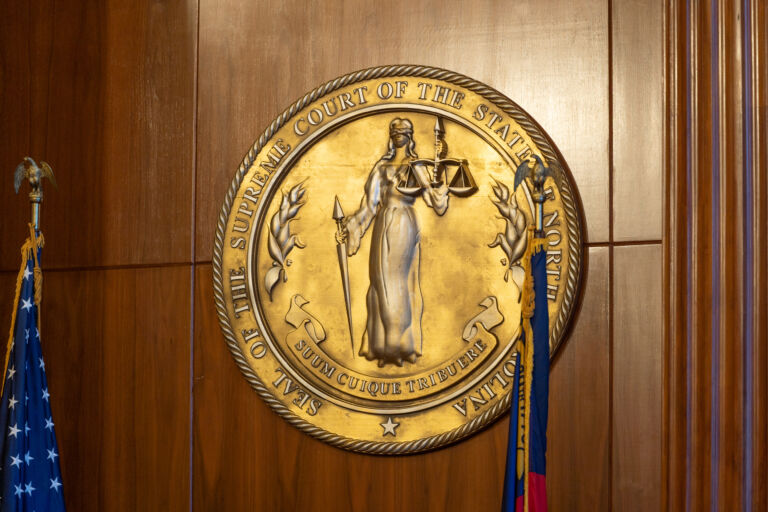Today, NC became the first eCourts state

In 1994, the Today Show’s Bryant Gumbel asked, “What is the internet, anyway?” His question seems ridiculous now, but at the time, millions of viewers were likely asking the same thing. Almost nothing was digital then, but technology has changed significantly since 1994. Most banking is now transacted online. Medical providers and patients can access medical records and fill prescriptions instantly on a smart phone. Even the notoriously slow DMV offers a multitude of online services. Until very recently, however, the North Carolina court system was still paper-based and required people to physically go to the courthouse to access paper records and transact routine business — just as they did in 1994 … and 1894.
Judicial Branch leaders recognized that a digital transformation of the court system was necessary to meet the mandate that justice be administered without favor, denial, or delay (as required by Article I of the North Carolina Constitution). Under the leadership of several chief justices from both parties, the Administrative Office of the Courts was tasked with implementing a digital platform that would transform the 100-county unified court system from paper to digital. The project was called eCourts.
This would prove to be a monumental task. North Carolina law is a mile wide and a mile deep, and the new eCourts system would need to accommodate a multitude of practice areas within the Bar and the complex legal issues of 11 million North Carolinians.
An inflection point arose when Paul Newby was sworn in as chief justice in January 2021. Contracts with vendors had been signed under previous administrations, but there was a very long way to go before the eCourts system was ready for implementation. When Chief Justice Newby took office, the state’s trial courts had been shut down as part of the government’s response to COVID, creating a seemingly insurmountable backlog of cases. Given the enormous challenge of restoring courtroom operations and digging out of this backlog, Chief Justice Newby could have scrapped the eCourts project using COVID as a convenient excuse.
Instead, he honored contracts entered into by his predecessors and moved forward with eCourts not only because of the consequences of breaking contracts, but because of his belief that the digital transformation was an operational necessity. The decades-old patchwork of systems that held together the courts’ records index system was in serious danger of crashing beyond repair. Credit goes to Newby for having the character and fortitude to move forward with eCourts at such a difficult time.
Through the General Assembly’s investments and the hard work and sacrifice of many key players across state government, the pilot counties of Wake, Johnston, Harnett and Lee went “live” with eCourts in February 2023. Then State Bar President Marcia Armstrong submitted the first electronic filing from her office in Johnston County on Feb. 13, 2023, and eCourts was off to the races. Aspects of the roll-out were certainly challenging, but given the totality of the circumstances it is rightly described as a success — particularly considering the magnitude of change and the complexity of the new system. Credit goes to the many district attorneys, clerks, judges, magistrates, and staff who have maintained professional excellence through this transition.
Today, on Oct. 13, 2025, the North Carolina Administrative Office of the Courts has fully implemented the eCourts project: All 100 counties are now “live” on the North Carolina Judicial Branch’s Enterprise Justice platform. This makes North Carolina the first state to transition statewide court operations for all case types solely to the cloud.
North Carolinians benefit from this in many ways. In all 100 counties, paper records have now been replaced with online access to justice, meaning that anyone with an internet connection can file court documents, search for records, and have 24/7 access to case events and court dates from the comfort of their home. Nearly 6 million electronic filings have already been accepted, saving many costly trips to the courthouse and over 20 million sheets of paper. More than 5 million searches are conducted monthly through the new online records portal.
Polling done by the NC Chamber last year underscores just how strongly North Carolinians back modernization of the courts. More than two-thirds of voters, 66%, favored continuing the transition to electronic records through the eCourts initiative, with 37% saying they strongly support it. That level of public endorsement reflects a broad, bipartisan understanding that modernizing our judicial system was long overdue. People want faster access to justice, greater transparency, and less bureaucratic delay. For policymakers, the message was clear: North Carolina’s citizens overwhelmingly want to bring their courts into the 21st century. Now they have.
eCourts will continue to improve, and just as Bryant Gumbel and the rest of the world now can’t fathom living without the internet, I strongly suspect that court officials, Judicial Branch employees, the Bar, and the public will soon forget what life was like before eCourts. Congratulations to the Judicial Branch for reaching this major milestone.
“Today, NC became the first eCourts state” was originally published on www.carolinajournal.com.











